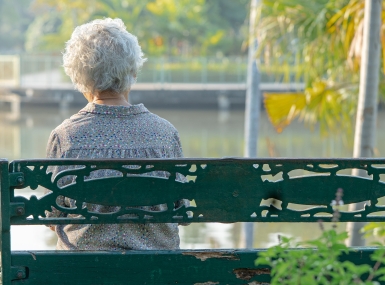Envisioning a new way to respond to mental health crises through 988 legislation
Author

Blaire Bryant
Upcoming Events
Related News

Key Takeaways
Approximately 11 million individuals are admitted into local jails each year, and according to data from the Vera Institute of Justice, nearly half of those individuals will have been diagnosed with a serious mental illness. As the number of individuals suffering with behavioral health disorders increases across the nation, so has the reliance on local jails, hospitals and emergency rooms to serve as de facto mental health facilities — with the three-digit dialing code 911 often the primary mode of service connection.
In 2020, Congress unanimously passed the National Suicide Hotline Designation Act (PL 116-172), which established the three-digit dialing code 988 as a national hotline for the coordination of local mental health crisis services. On July 16 of this year, the 988-dialing code will officially replace the 10-digit number for the National Suicide Prevention Lifeline currently in use in communities across the country.
However, beyond the inherent accessibility of a three-digit code, the transition to 988 is just the first step in transforming the way that we respond to behavioral health crises in the United States. The implementation of 988 will require national uniformity in service delivery that connects individuals in crisis to timely and appropriate care, in the most appropriate setting.
| Focus area | Bill | Sponsor | Key provisions |
|---|---|---|---|
| Supporting the full 988/crisis response infrastructure | H.R. 7116 (988 Implementation Act of 2022) | Rep. Cardenas (D-Calif.); bipartisan | Funding for hard infrastructure Support for crisis workforce development Support for access through health insurance (including Medicaid) Technical assistance/public awareness |
| H.R. 7232 (988 and Parity Assistance Act of 2022) | All provisions in H.R. 7116 with exception of Medicaid insurance coverage | ||
| Support for the 988 telecom system | S. 1570 (HELP Act of 2021) | Sen. Casey (D-Pa.); bipartisan | Allocates fundings to improve 211 and 988 telecommunication systems |
| Funding crisis response services & workforce | H.R. 5611/S.1902 Behavioral Health Crisis Services Expansion Act | Rep. Blunt Rochester (D-Del.); bipartisan | Establishes minimum requirements for core crisis services Provides coverage for crisis services under all insurers Funds crisis services Establishes coordination council |
| Raising public awareness | S.2425 (Suicide Prevention Lifeline Improvement Act of 2021) | Sen. Reed (D-R.I.) | Requires SAMHSA to raise awareness about National Suicide Lifeline program and collect related demographic information |
The increased accessibility and utilization of the National Suicide Lifeline is expected to produce a greater demand for services that must be met with a well-resourced response system. The Substance Abuse and Mental Health Services Administration (SAMHSA) describes this reimagined crisis response system as having three main components:
- Someone to call.
- Someone to respond.
- Somewhere to go.
Incorporated in these three elements are trained crisis call center staff, mobile crisis teams with mental health professionals that co-respond with law enforcement to crisis situations and crisis stabilization programs that allow for a warm hand-off to long term supportive care for the individual.
Learn More
Someone to Call During a Behavioral Health Emergency: Transition to 988 in Every County
Building this new robust crisis response system will require sustained investment at the federal, state and local level. This past February at NACo’s Legislative Conference, counties voted on and passed an interim resolution that outlined federal policy priorities for building the local crisis response system, titled “Supporting 988 Implementation and Comprehensive Behavioral Health Crisis Care.” The resolution outlines five key areas of investment needed at the federal level, which include:
- Creating a universal standard for behavioral health crisis services for all communities
- Funding local crisis call centers and related behavioral health services
- Establishing a federal Behavioral Health Crisis Coordinating Office
- Authorizing the use Medicaid funding for call center operations and crisis service provision
- Funding the behavioral health work force and related capitol development and improvement projects.
Federal policymakers at both the agency and congressional levels have been responsive to county requests for investments in this space. On April 19, the Biden administration announced it would award approximately $105 million to 54 states and territories to support crisis call center services, ahead of the July implementation of 988. Alongside this investment, Congress is currently considering a myriad of bipartisan bills that would support the launch of 988 and the development of local crisis response systems. The chart to the right tracks these legislative efforts.
As key administrators of behavioral health services, counties will be a vital force in building a continuum of care for people in crisis around the 988 National Suicide Lifeline. Counties support legislation that ensures that all people have access to comprehensive crisis care services that direct them to the most appropriate treatment options and lead to better health outcomes.
For more information on how your county can prepare to implement 988, see NACo’s blog “Someone to Call During a Behavioral Health Emergency: Transition to 988 in Every County."
Attachments
Related News

Podcast: Counties fight social isolation
As awareness of social isolation spreads, Sen. Chris Murphy (D-Conn.) and Loudoun County, Va. Chair Phyllis Randall discuss the role of government in combatting the problem.

NACo submits recommendations on the 2026 National Drug Control Strategy
On June 20, NACo submitted formal comments to the White House Office of National Drug Control Policy (ONDCP) to help shape the development of its 2026 National Drug Control Strategy. This strategy serves as the nation’s blueprint for reducing illicit drug use, and the ONDCP plays a central role in coordinating federal drug policy across government agencies.

U.S. House of Representatives introduces legislation to expand Medicaid coverage for behavioral health treatment facilities
On June 20, a bipartisan group of lawmakers introduced the Increasing Behavioral Health Treatment Act in the U.S. House of Representative. This bill aims to improve access to behavioral health care nationwide by removing long-standing Medicaid funding restrictions for behavioral health treatment in certain facilities, providing new flexibility for states and counties to meet growing behavioral health needs.